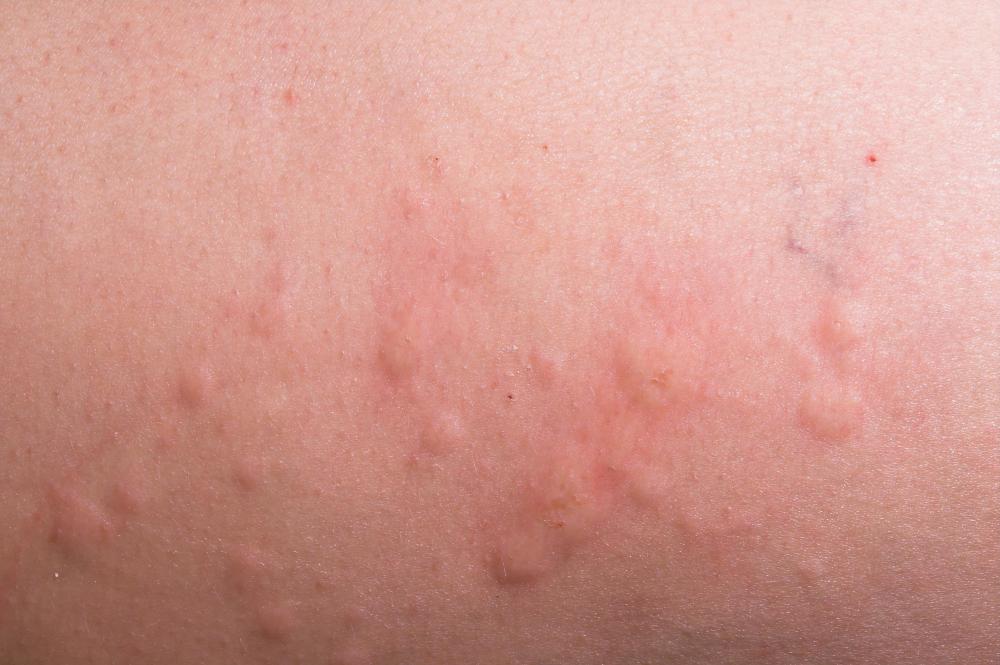At WiseGEEK, we're committed to delivering accurate, trustworthy information. Our expert-authored content is rigorously fact-checked and sourced from credible authorities. Discover how we uphold the highest standards in providing you with reliable knowledge.
What are the Treatments for Hives?
Taking antihistamine medications and steroids and avoiding tight clothing and certain foods are tried and true methods of treatments for hives. Medication that disrupts histamine compounds can treat hives, though it is usually recommended to first attempt to treat the cause, if it is known. Steroids are generally a last resort for treating hives, but they can be very effective for hives that are not responsive to other types of treatment. What works for some people does not always work for others, however, so experimenting with caution may be necessary.
One of the most common treatments for hives is the administration of antihistamine medications, which is a typical treatment for many other symptoms of allergies as well. There are many different types of antihistamines, and they all work by disrupting the histamine compounds that are activated in a body by the immune system. Many antihistamine medications can be acquired without a doctor’s prescription, but there are some that require one. Though antihistamine medications as a whole typically work in similar fashions, they have differing side effects.

When a person has hives that are not responding to typical antihistamine treatments, doctors will often administer a steroid medication, such as cortisone, to get rid of the hives. These types of medications often affect the entire immune system of the patient when being used to eliminate hives and can have serious side effects when used in excess. As a less extreme treatment, topical creams can also be used to distribute some steroid medications.

In many situations, the best treatments for hives are simple home remedies, changes in behavior, or avoidance of environmental causes. Often, the clothing worn on the affected area can be irritating the body in some way. Overly tight clothing can sometimes be a cause, as can overly loose clothing. Another way that clothing can lead to hives is by harboring residues from detergents that are irritating the skin. If problems like these are suspected, switching the types of clothing that is being worn or washing clothing using an ammonia solution and hot water can sometimes be effective treatments for hives.

Sometimes avoiding certain foods can prove to be an effective treatment for hives, as many food allergies can result in hives. Nuts as well as eggs and some seafood are among the foods that can result in hives. Allergic reactions from other sources can also commonly result in hives. Removing the source of the allergy, be it a pet animal or latex, can prove to be effective treatments for hives.
AS FEATURED ON:
AS FEATURED ON:

















Discussion Comments
I get hives sometimes from insect bites. The best treatment I've found for this is aloe vera gel with lidocaine. It relieves my rash and itching within minutes.
@turkay1-- Have you tried immunosuppressant medications? These treat hives by reducing the immune system's reaction. You should ask your doctor about it.
I have chronic hives and I'm on multiple medications including an anthisitamine, an immunosuppressant medication and a psychotropic medication. The psychotropic is basically to relax me so that I don't get hives from mood changes.
Right now, I'm happy with my treatment but I think I would like to look into natural treatments for hives for the long-term.
I have chronic urticaria. I get hives basically every day, but it's worse when I'm stressed and during the summer because of the heat. I've been on three different antihistamines during the past six months. I take oral antihistamines and I also use topical antihistamines. On some days, they work fine, on others, they're not enough.
Does anyone else here have chronic hives? What are you being treated with?
Post your comments